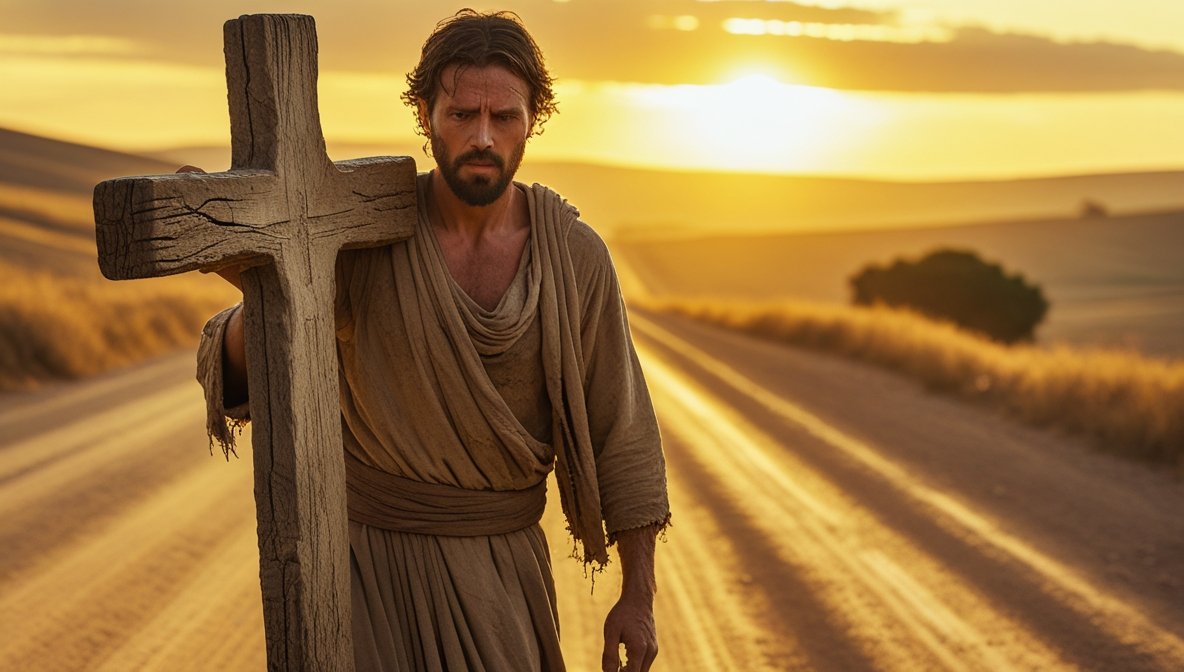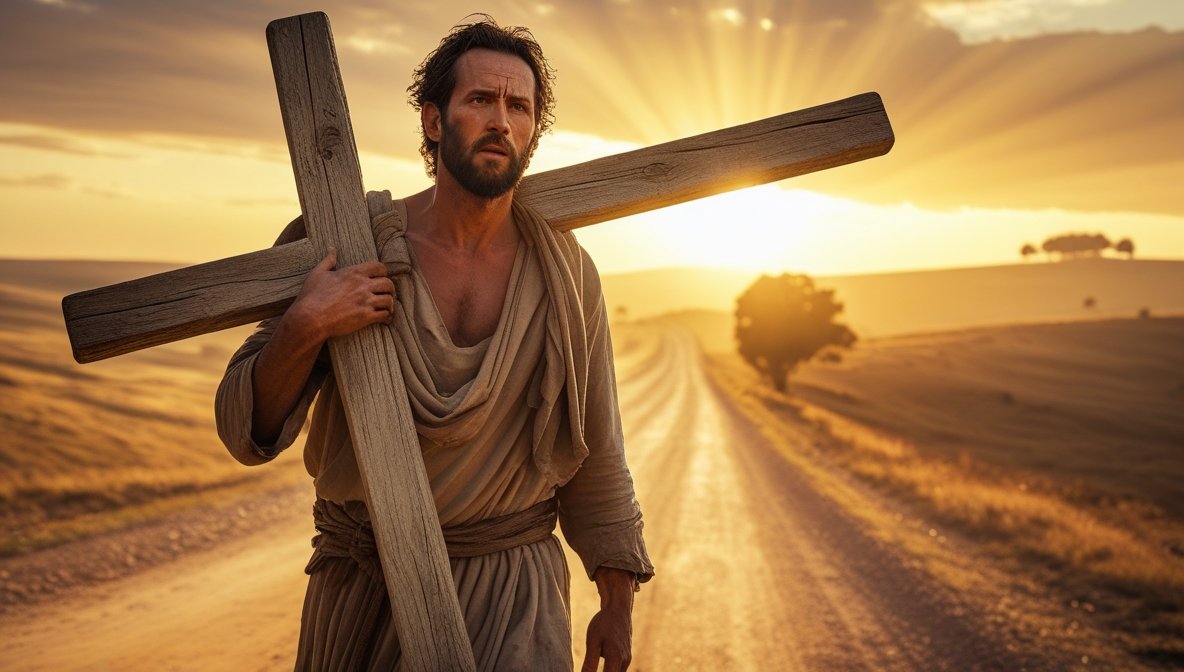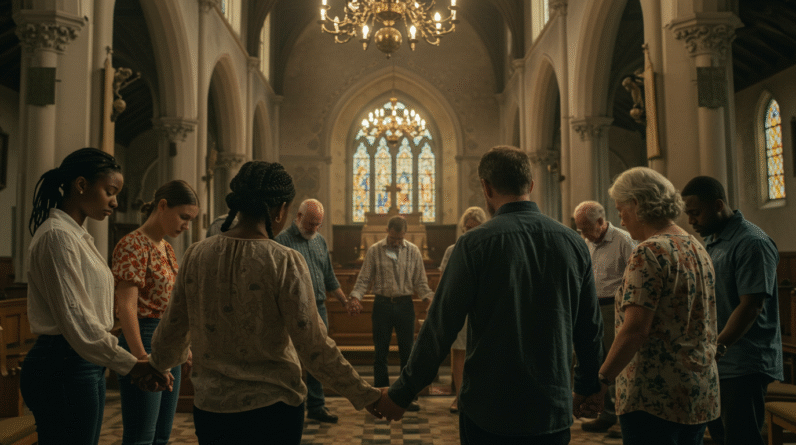The Cost Of Discipleship – Following Jesus Wholeheartedly
You probably know what people mean when they say “disciple.” You grew up with that word in church, in Sunday school, on posters, in small group emails that sound perfectly earnest and slightly tired. But you also know there’s a distance between the word and the life. Attending feels safe. Surrendering does not. This piece is for the part of you that feels a slow, persistent tug toward something harder than attendance, something that asks you to rearrange your life. At its simplest: the cost of discipleship is not membership. It is a decision to follow, wholly and without reservation, a person—Jesus—who asks you to leave the things you call safety behind.
You’ll see Bible passages woven through this conversation. I use them not as irrefutable arguments but as invitations: texts that press you to look honestly at what you are living for. You can read Luke, Matthew, Mark, John, Paul and the Hebrews letters on Bible Gateway if you want to see the words in their wider context. They shock and console. They unsettle you. They also, sometimes, make you breathe easier because they name things you’ve been afraid to say.
What discipleship is not: a weekly ritual
There’s a comfortable lie you can tell yourself: religious life equals routine. You go to a church service, you give, you nod at the right moments, you read a devotional online. None of that is bad. But if those things become an end in themselves, they are a kind of camouflage. You might look like a disciple while actually avoiding the cost.
Jesus’ call is more demanding than ritual. He calls you into a way of living that changes your loves. If you only measure discipleship by attendance or by the times you sign your name on a roster, you’ll miss what’s being asked of you. The Scriptures keep returning to that same tension: the visible signs of belonging versus inner allegiance. Read Luke’s account where Jesus says to take up your cross daily—there’s no room for half-measures in that language. See it for yourself: Luke 9:23.
Count the cost: Jesus makes you do the arithmetic
You remember the story where Jesus tells people to calculate what it will cost to build a tower or to go to war if they can’t win. It sounds like a math lesson, but it’s really a moral and spiritual test. He asks, “Can you pay the price?” and he wants your answer before you commit. When he says you must hate your father and mother and even your own life, he’s not prescribing cruelty to your family. He’s using hyperbole to make a point: your allegiance must be decisive. Read the passage: Luke 14:26-33.
If you’re honest, you notice that this invitation forces you into trade-offs. Following Jesus shapes priorities and rearranges loves. For you that might mean choosing a career that serves rather than one that simply pays. It might mean being available to someone else instead of protecting your weekends. The cost of discipleship isn’t measured only in dramatic martyrdom; it’s also measured in thousands of small, accumulative choices that show where your heart actually is.
Deny yourself: the daily work of letting go
Denying yourself is not the same as punishing yourself. It’s the daily discipline of refusing to make your comfort the organizing principle of your life. When Jesus says you must deny yourself and take up your cross, he’s asking you to put the kingdom first—love, justice, mercy—above the immediate satisfaction of your desires. See Paul describing how what you once valued becomes nothing compared to Christ: Philippians 3:7-8.
That’s the shape of practical discipleship. You learn to say no to impulses that narrow you and yes to sacrifices that widen you. You practice patience in conversations you’d rather end. You show up for inconvenient people. It’s not glamorous. It is, though, profoundly formative. Over time, the habit of choosing what’s other-focused transforms your nervous system. You stop being surprised by the small ways your life inconveniences you for the good of others.

Loss and gain: the paradox of true life
There’s a paradox in the texts. If you cling to your life, you lose it; if you lose your life for Jesus, you find it. You can hear it like a song you don’t want to sing because it forces you to reevaluate your attachments. The proverb is blunt in Matthew: if you want to save your life, you will lose it; if you lose your life for Jesus’ sake, you will find it. You can read the passage here and see the edges of that paradox: Matthew 16:24-26.
You don’t have to manufacture drama to feel the weight of this. Sometimes the cost shows up as losing reputation among people who prefer comfort. Sometimes it’s a relationship strained when you refuse to conform to a lifestyle that contradicts what you now profess. Sometimes it’s internal: letting go of an identity you’d dyed for so long that the color settled into your skin. Yet alongside that loss is a discovery—an unanticipated sense of belonging to something larger than your life. You begin to taste a joy that isn’t dependent on your rising ledger of comforts.
The social consequences: friendship, family, and belonging
You are social. So when you reshape your life around Jesus, other people notice. They might be delighted, confused, hurt, or angry. Jesus anticipates this. He talks openly about causing division because of the demand to follow him. Read Matthew on the tension between familial love and filial love to God: Matthew 10:37-39.
This is painful because your nearest relationships are often the ones most affected. Expect to grieve. Expect also to gain new fellow companions over time—people who have chosen the same way and will help shoulder the burdens. Community is not an optional add-on. It is the context in which you learn to carry suffering, to celebrate small victories, to be corrected, to be loved back into humility. You will need that. Hebrews reminds you to consider one another and not give up meeting together, because the collective life strengthens the individual: Hebrews 10:24-25.
Suffering and joy: two sides of the same coin
If you follow, you will suffer. That’s a hard sentence to write and another harder to accept. Jesus did not promise buffering from difficulty. He promised presence. He did not charter a cruise that keeps you untouched. He promised a journey through storms with him near. In John, he tells you plainly that in this world you will have trouble, and then he offers his peace: John 16:33.
There’s a weird alchemy here. Suffering can deepen your compassion. It can make your prayers less decorative. It can keep you from self-deception. At the same time, joy—often overlooked in sober talks about cost—remains a real fruit of this path. It’s quieter and smaller than the kind of joy sold in magazines, but it’s durable. It persists when the lights are off.
Misunderstanding success: renouncing worldly measures
You live in a culture that rates success by visibility, convenience, wealth, and influence. Those measures are useful sometimes, but they are not gospel metrics. Discipleship asks you to adopt a different scoreboard. Jesus tells you that anyone who loves father or mother more than him is not worthy of him—this is provocative, but its force is to redirect your ultimate loyalties: Mark 8:34.
You start measuring success differently: by faithfulness rather than applause, by kindness rather than acclaim, by patience rather than prominence. That shift will lose you some fans. It will also free you to pursue things that matter. You’ll find that some of your time, money, and reputation can be spent in ways that produce a quieter, truer fruit.
The mission: you’re invited to participate
Following Jesus isn’t only about private holiness. It’s also about mission—the outward motion of love toward people who need it. The command to make disciples is entangled with the cost. When you’re sent, you are vulnerable; you’re exposed; you don’t always know the outcome. Yet you’re also part of something that outlasts you. Read the Great Commission: Matthew 28:18-20.
Mission shifts daily choices into a broader horizon. Who you befriend, who you feed, who you defend, and who you forgive—these are small acts of mission when they’re done with the intention of embodying God’s kingdom. The cost of discipleship becomes communal when mission is translated into how a neighborhood is loved back to life. You become part of a story with stakes beyond your biography.
Discipline and the race: training your heart
Paul speaks of running a race and disciplining the body, not as metaphors for masochism but as practical advice for focus and perseverance. Spiritual formation is a kind of training ground: you practice disciplines—prayer, study, acts of service—so that when difficulty comes, you have muscle memory for faithfulness. Read Paul’s athletic language here: 1 Corinthians 9:24-27.
That training doesn’t aim to earn you a prize through grit alone. It gives you patterns that reorder desire. The point isn’t to become ascetic for its own sake but to cultivate a freedom from compulsions that pull you away from what is good. You grow less reactive, more deliberate.
Ethics of everyday: the invisible ways you surrender
Discipleship sounds grand. But a lot of the cost is in the small, almost invisible daily ethics you practice. How do you spend your money? How do you use your phone in the presence of someone who’s lonely? Do you speak the truth when a lie would be easier and more profitable? These are the places where the theoretical becomes concrete.
A small list of everyday choices that reveal where you stand:
- How do you prioritize time with people in need?
- How you speak about enemies when no one else is listening.
- How do you choose rest and Sabbath in a culture of productivity?
These ordinary disciplines accumulate. They either make you harder and closed or softer and more attentive. The way you treat marginal, inconvenient demands shows whether you’re ready to pay the price.
When you feel you don’t have enough faith
You worry sometimes that you don’t have enough faith to follow. That you’ll fail. That the cost will outstrip your capacity. That worry is honest. Discipleship is not a contest of moral stamina. It’s a process in which you practice faithfulness in small steps. The writer of Hebrews compares the faithful to runners in a race and tells you to fix your eyes on Jesus as the pioneer and perfecter of faith: Hebrews 12:1-2.
The community helps here. You don’t have to muster faith out of thin air. You receive it, like a loan, from a congregation of people who remember the promises when your memory fails. You also give it back by showing up, even when your trust is thin.
Practical formation: habits that shape love
If you want to take steps toward wholehearted following, do not underestimate habit. Habits are the architecture of a life. Start where you can. Pray in small increments. Read a short passage with the intention of listening rather than proving. Practice hospitality in tiny ways. These acts are not about performative piety but about retraining your eyes to notice God.
You’ll find, after a while, that small disciplines don’t feel small. They begin to generate a steady courage. Your life becomes less reactive to each passing fear and more responsive to the enduring claim of love. Romans invites you to present your bodies as a living sacrifice, which is another way of saying: live openly as someone who belongs to God and whom God reshapes. Read: Romans 12:1-2.
The economics of giving: money, time, and priorities
Money is a blunt but honest litmus test. What you spend reveals what you worship. Jesus used money to test hearts. He said where your treasure is, there your heart will be also. Your willingness to give—of time, of income, of influence—signals where your ultimate trust lies. You can read across the gospels the way he frames this question. One clear instance is when he points to people who invest in the kingdom rather than in accumulation.
Generosity isn’t about proving devotion. It’s a practical training for dependence—not on your savings but on God and one another. When you decide to redistribute some of what you have, you begin to see how fragile systems can be and how much you are embedded in a network of need and grace.
Courage to be small: rejection, humility, and reputation
Part of the cost is reputational. The route of discipleship often leads to humility rather than prominence. People who choose this way learn to be content with being unnoticed. That’s not a call to invisibility as a virtue. It’s an invitation to let God be your primary audience.
Jesus warned that following him would sometimes make you lose popularity. You might be mocked. You might be ostracized. That’s a high price. But when your identity is reframed around being beloved by God rather than being admired by people, you gain a resilience that criticism can’t easily overturn. Read Jesus’ blunt remarks about loyalty and rejection in Mark: Mark 8:34.
The communal economy: you are not alone
Discipleship is not purely individualistic. You are shaped by a body—people who pray, feed, argue, and forgive together. That means the cost of discipleship is partially social. Your choices ripple through a community. They can relieve, burden, or bless others. You’ll find that walking together reduces weight. People will help carry you, and you will help carry them.
There’s also accountability in this arrangement. You will be corrected. You will be loved back into alignment. That friction is itself a form of teaching—sometimes painful, often necessary.
The long view: perseverance rather than instant transformation
The scriptures are patient with you. Many biblical narratives are about long processes, not overnight conversions. Paul writes in measured tones about sanctification as an ongoing work. The image of a race, of training, of endurance suggests that holiness is more often formed slowly than acquired suddenly. Read Paul’s emphasis on perseverance here: Philippians 3:7-8.
You will not be perfect. You will stumble. The invitation of discipleship is that these stumbles do not disqualify you. They are part of the curriculum. Keep showing up. Keep returning. Keep seeking to love.

Final reflections: why you might pay the price
You might ask yourself whether the price is worth it. It is reasonable to ask whether surrender will yield something that satisfies. The answer, complicated and simple, is that what Jesus offers is a reordering of desire in which life itself is found. That’s not a promise of comfort, but it is a promise of meaning. In the gospel of John, Jesus says that anyone who loves their life will lose it and anyone who hates their life in this world will keep it for eternal life—again, paradox, again the call to see life at a different angle: John 12:25-26.
Remember that the cost of discipleship is not a price you pay to earn worth. It is the practice through which you learn to live in the worth you already have. You are invited into a transformed set of loves. It is costly because it changes everything, but in that change, you discover a surprising largeness of heart and a quieter joy.
A few practical next steps
If you’ve read this far, you’re probably wondering what an honest next step might look like. Here are three modest actions:
- Choose one habit to begin this week (five minutes of prayer, a short Scripture reading, or one act of kindness).
- Name one relationship you will invest in rather than protect your time from.
- Join a small group where you can be known and corrected.
Remember the metaphor of training and the invitation to steady, patient practice. The cost of discipleship shows up in ordinary days. Those days make saints.
You can study further passages on these themes—like the wisdom about sacrifice in Luke when he asks you to estimate the price—by reading the linked texts throughout this article. The Bible is stubborn in its insistence that following Jesus requires less image management and more interior rearrangement. If you feel called, the way forward is patient, communal, and marked by small, persistent acts of obedience.
Explore More
For further reading and encouragement, check out these posts:
👉 7 Bible Verses About Faith in Hard Times
👉 Job’s Faith: What We Can Learn From His Trials
👉 How To Trust God When Everything Falls Apart
👉 Why God Allows Suffering – A Biblical Perspective
👉 Faith Over Fear: How To Stand Strong In Uncertain Seasons
👉 How To Encourage Someone Struggling With Their Faith
👉 5 Prayers for Strength When You’re Feeling Weak

📘 Jesus and the Woman Caught in Adultery – Grace and Mercy Over Judgement
A powerful retelling of John 8:1-11. This book brings to life the depth of forgiveness, mercy, and God’s unwavering love.
👉 Check it now on Amazon
As a ClickBank Affiliate, I earn from qualifying purchases.
Acknowledgment: All Bible verses referenced in this article were accessed via Bible Gateway (or Bible Hub).
“Want to explore more? Check out our latest post on Why Jesus? and discover the life-changing truth of the Gospel!”








